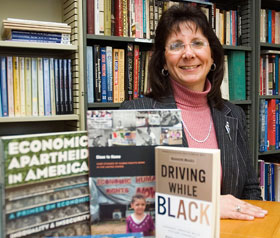  |
| HOME | THIS ISSUE | CALENDAR | GRANTS | BACK ISSUES | < BACK | NEXT > |
New sociology course to explore human rights in the United Statesby Sherry Fisher - March 13, 2006 |
||||
|
“Human Rights in the United States,” a new sociology course, will be offered in the fall. The course will cover economic, racial, and gender justice; prisoners’ rights and capital punishment; the role of the U.S. in international human rights agreements and treaties; and struggles on behalf of human rights. Sociology department head Davita Silfen Glasberg developed the course with Bandana Purkayastha, associate professor of sociology, with a grant from the Human Rights Institute. Glasberg, former director of the human rights minor, says the new 200-level course adds a needed perspective on human rights. “Many people are under the impression that human rights issues occur solely in countries outside the United States,” she says. “I think it’s a general assumption that the U.S. is the gold standard of human rights practices. Unfortunately, that leads students to believe that violations are typical elsewhere in the world but not in this country. It’s a perception that is very unlikely to enhance a broader perspective of global patterns and global relations. “Even though the Universal Declaration of Human Rights emerged through the U.S. after World War II, it doesn’t mean there aren’t any issues here,” she adds. Sociology is “particularly well placed” as a discipline to explore the similarities and differences between human rights in the United States and around the world, she says, noting that the American Sociological Association recently began the process to develop a section on the sociology of human rights. “Sociologists have talked about these kinds of issues for a long time,” Glasberg says. “It’s part of what we do: discuss issues such as oppression, equality, and social justice. A lot of research has been conducted in sociology on civil rights, women’s rights, and gay rights, but the language of human rights has not been used for framing our interrogation. And we haven’t taken these issues to task in terms of the Universal Declaration of Human Rights.” That’s why she decided to develop the new course. “Sociology is really poised as a discipline to take on these kinds of issues,” Glasberg says. “We don’t have any courses in the human rights minor or in other departments on campus that focus explicitly on human rights in quite this way.” Glasberg says the human rights studies have grown in the past two years. There are now 56 students who minor in human rights, and 11 with individualized majors in human rights and economic rights. The course will begin with a discussion on the meaning of human rights and justice and the difference between these two concepts. “What does human rights truly mean? Is it possible to have rights without justice?” Glasberg asks.
Discussion about the relationship between the state and the individual will follow. “Who secures human rights? Is it something that individual states should do? Can we rely on them to do that? Is it okay for an international body to step in and take over the sovereignty of individual states and make them do it? “We want students to think outside their comfort zones about these issues,” Glasberg says. “We want them to think about the difference between civil rights and human rights, and the difference between group and individual rights. Once students have grasped those general concepts in the United States, they will look at some specific issues, such as prisoners’ rights and capital punishment; economic, racial, and gender justice; the United States’ role in international human rights agreements and treaties, and its practices in implementing or not implementing these agreements; and struggles on behalf of human rights.” Glasberg says because the course requires in-class discussion, it should be no larger than 70 students. There currently are no textbooks for a course like this, she adds. “Instead, each time we approach a topic, students will read a monograph or selection of journal articles,” she says. “They might also be asked to read an article from the New York Times, or to find an article on a particular issue to help them apply the concepts they’re learning to events and struggles today.” Glasberg says reading current newspaper articles “sensitizes students to look at the world. We’re not just reading abstract theoretical materials; we are looking at how these theoretical materials operate in the world as we speak.” The course will end with an exploration of social movements, she says. “We want students to have a sense that there is work being done on human rights issues,” she says, “and there are opportunities for those who are frustrated enough with the state of affairs to make changes.” |
| ADVANCE HOME UCONN HOME |

